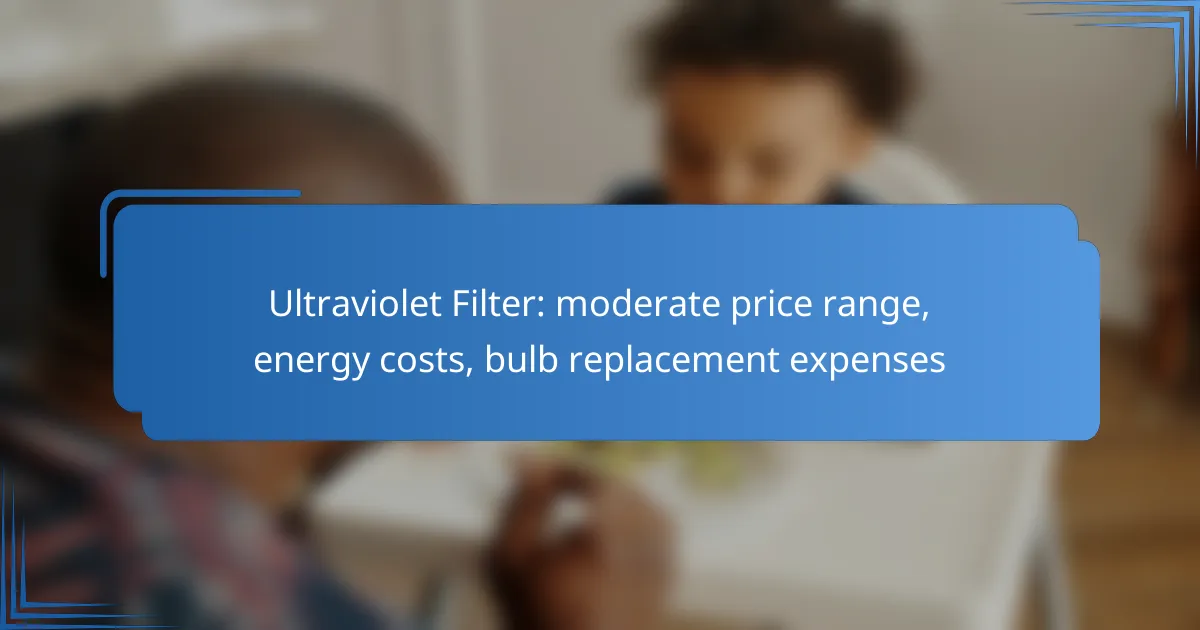For those seeking a balance between quality and affordability, moderate-priced ultraviolet filters typically range from $50 to $150. These filters not only reduce UV exposure but also enhance HVAC efficiency, leading to lower energy costs and reduced utility bills. Additionally, while bulb replacement expenses can vary, they generally fall within a moderate to higher price range depending on the system’s requirements.
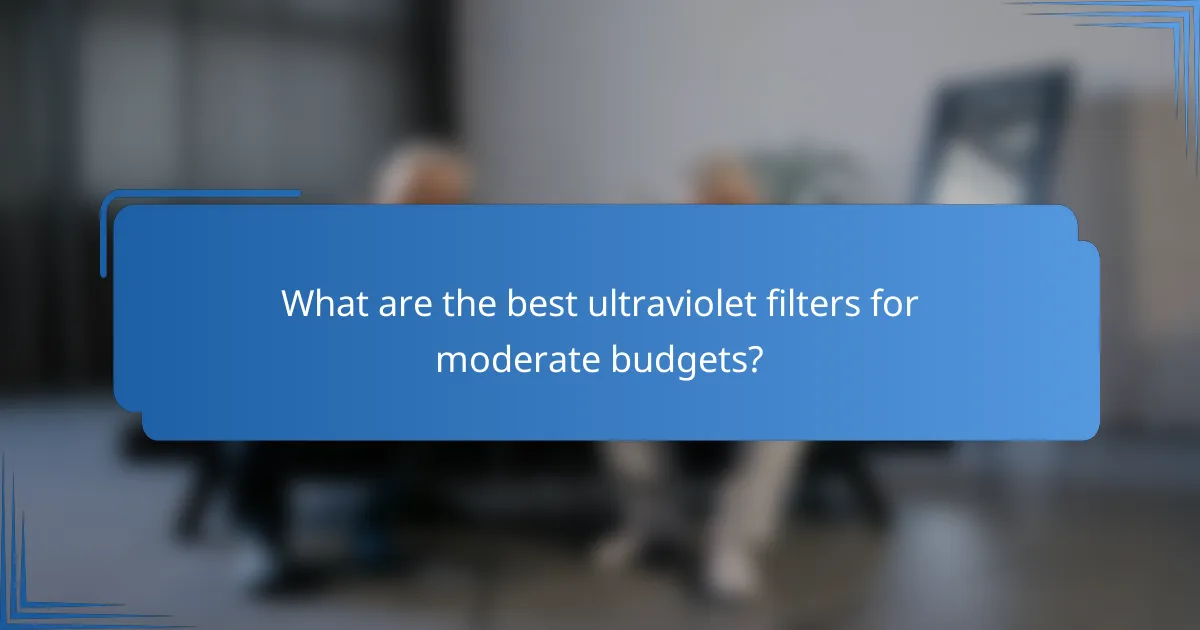
What are the best ultraviolet filters for moderate budgets?
For moderate budgets, the best ultraviolet filters balance quality and affordability, typically ranging from $50 to $150. These filters effectively reduce UV exposure while maintaining energy efficiency and minimizing bulb replacement costs.
Brand A Ultraviolet Filter
Brand A offers a reliable ultraviolet filter priced around $75. It features a durable design and is known for its effective UV reduction, making it suitable for both residential and commercial use.
This filter operates efficiently, helping to lower energy costs by reducing the strain on lighting systems. Users report an average lifespan of about 12 months before needing a replacement, which is reasonable for its price point.
Brand B Ultraviolet Filter
Brand B’s ultraviolet filter is available for approximately $100 and is praised for its high performance and energy efficiency. It is designed to fit various lighting fixtures, ensuring versatility in installation.
With a lifespan of around 18 months, this filter minimizes replacement expenses. Additionally, it can contribute to lower energy bills by enhancing the efficiency of light sources, making it a cost-effective choice for budget-conscious consumers.
Brand C Ultraviolet Filter
Brand C presents a budget-friendly ultraviolet filter at about $60. This option is ideal for those seeking a balance between cost and effectiveness, providing solid UV protection without breaking the bank.
While it may not last as long as its competitors, averaging around 10 months, its lower initial cost makes it appealing for short-term use. Users should consider the potential for increased energy costs if frequent replacements are necessary.
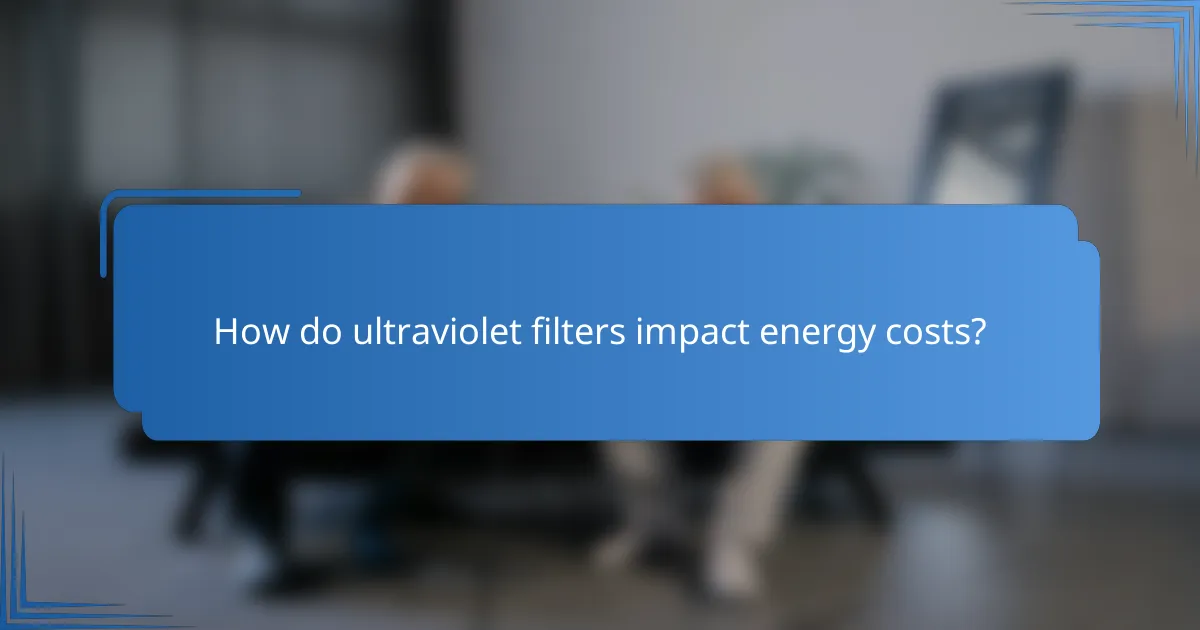
How do ultraviolet filters impact energy costs?
Ultraviolet filters can significantly influence energy costs by enhancing the efficiency of HVAC systems and reducing the workload on air conditioning units. By improving air quality and reducing pollutants, these filters can lead to lower energy consumption and, consequently, decreased utility bills.
Energy efficiency of ultraviolet filters
Ultraviolet filters are designed to eliminate harmful microorganisms, which can improve overall air quality and system efficiency. By maintaining cleaner coils and ducts, these filters help HVAC systems operate more effectively, potentially leading to energy savings of around 10-30% depending on usage and maintenance.
Regular maintenance and timely replacement of ultraviolet filters are crucial for sustaining their energy efficiency. Neglecting this can result in reduced airflow and increased energy consumption, negating any potential savings.
Comparative energy costs of different brands
The energy costs associated with ultraviolet filters can vary widely among different brands. Generally, mid-range filters priced between $50 and $150 tend to offer a balance of efficiency and affordability, while premium options may exceed $200 but promise longer lifespans and better performance.
When comparing brands, consider not only the upfront cost but also the expected lifespan and energy savings. Some brands may provide warranties or guarantees that can offset long-term costs, making them a more economical choice over time.
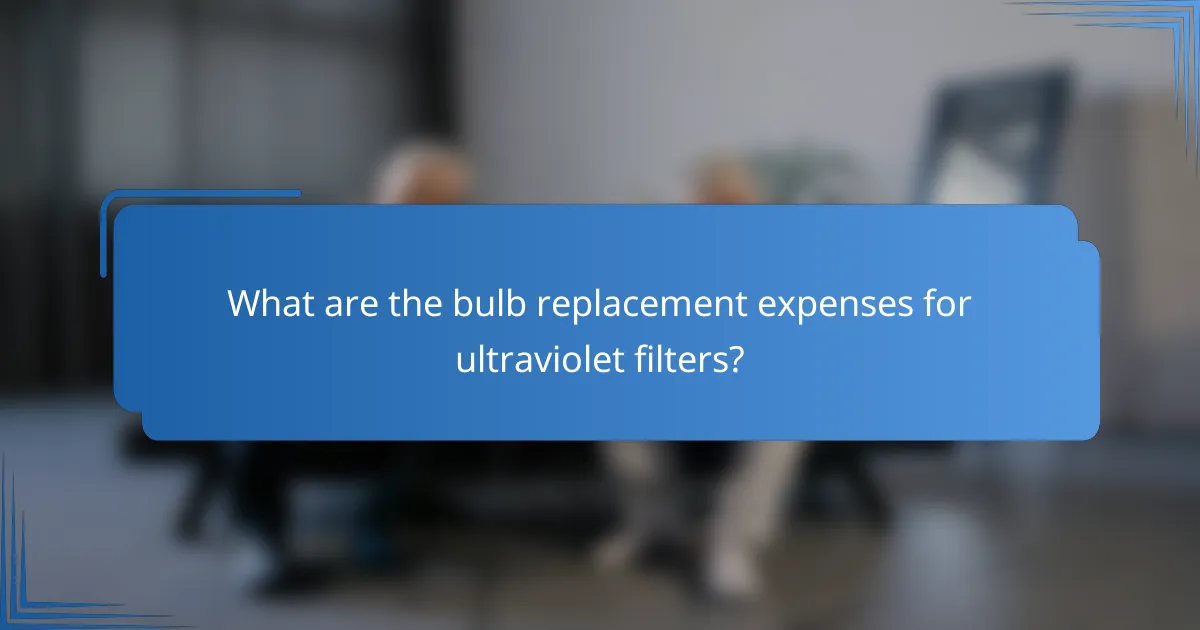
What are the bulb replacement expenses for ultraviolet filters?
Bulb replacement expenses for ultraviolet filters can vary based on the brand and type of bulb used. Generally, these costs can range from moderate to higher prices depending on the specific requirements of your UV system.
Replacement costs for Brand A bulbs
Brand A typically offers UV bulbs priced between $30 and $60 each. These bulbs often have a lifespan of around 9,000 to 12,000 hours, making them a cost-effective choice for regular use. When budgeting for replacements, consider the frequency of use and the overall maintenance of your UV system.
It’s advisable to purchase Brand A bulbs from authorized retailers to ensure authenticity and warranty coverage. Some retailers may offer bulk purchase discounts, which can further reduce your overall expenses.
Replacement costs for Brand B bulbs
Brand B bulbs usually fall within the $40 to $80 range. They may offer enhanced performance or longer lifespans, typically around 12,000 to 15,000 hours. While the initial cost is higher, the extended lifespan can lead to lower long-term expenses.
When selecting Brand B, check for compatibility with your existing UV system. Investing in quality bulbs can prevent frequent replacements and ensure optimal performance, ultimately saving you money over time.
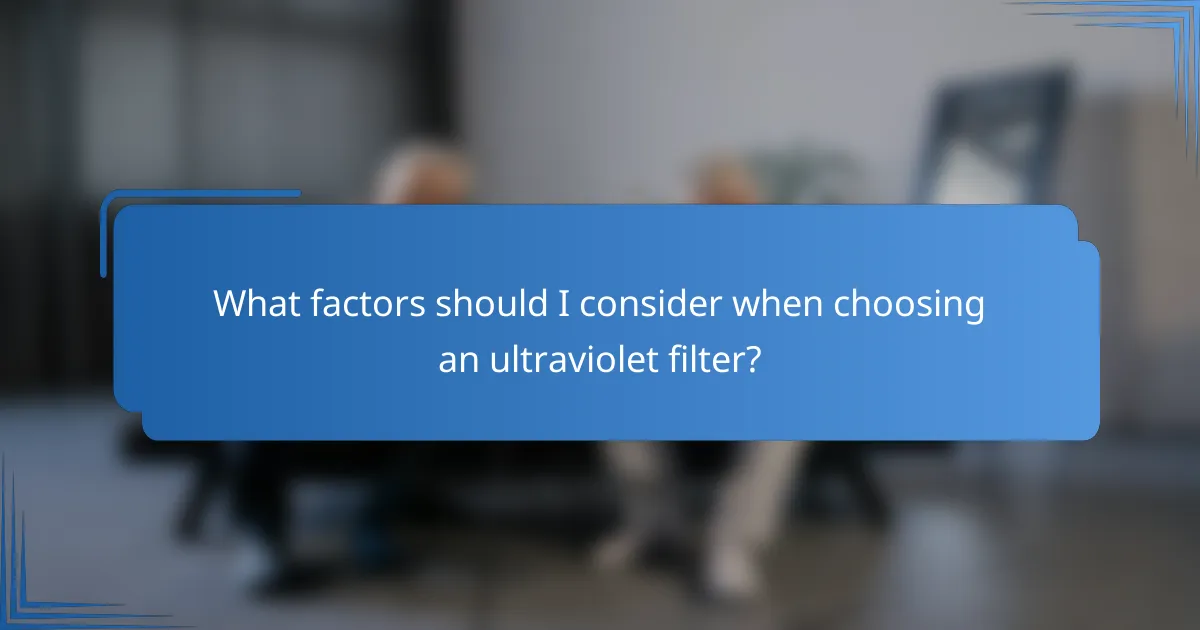
What factors should I consider when choosing an ultraviolet filter?
When selecting an ultraviolet filter, consider its effectiveness, durability, and lifespan. These factors will impact both the performance of the filter and the overall costs associated with energy and bulb replacements.
Filter effectiveness
Filter effectiveness refers to how well the ultraviolet filter blocks harmful UV rays. Look for filters that meet industry standards, as these will typically provide better protection. A good filter should block at least 90% of UV radiation to ensure safety and efficiency.
Consider the specific application of the filter. For instance, filters used in aquariums or for sterilization purposes may require higher effectiveness compared to those used for general lighting. Always check product specifications to ensure the filter meets your needs.
Durability and lifespan
Durability and lifespan are crucial when evaluating ultraviolet filters, as they affect long-term costs. Most moderate-priced filters can last anywhere from 6 months to 2 years, depending on usage and environmental conditions. Regular maintenance can extend their lifespan significantly.
When choosing a filter, consider the material and construction quality. High-quality filters may have a higher upfront cost but can save money over time by reducing the frequency of replacements. Look for warranties or guarantees that indicate the manufacturer’s confidence in their product’s durability.
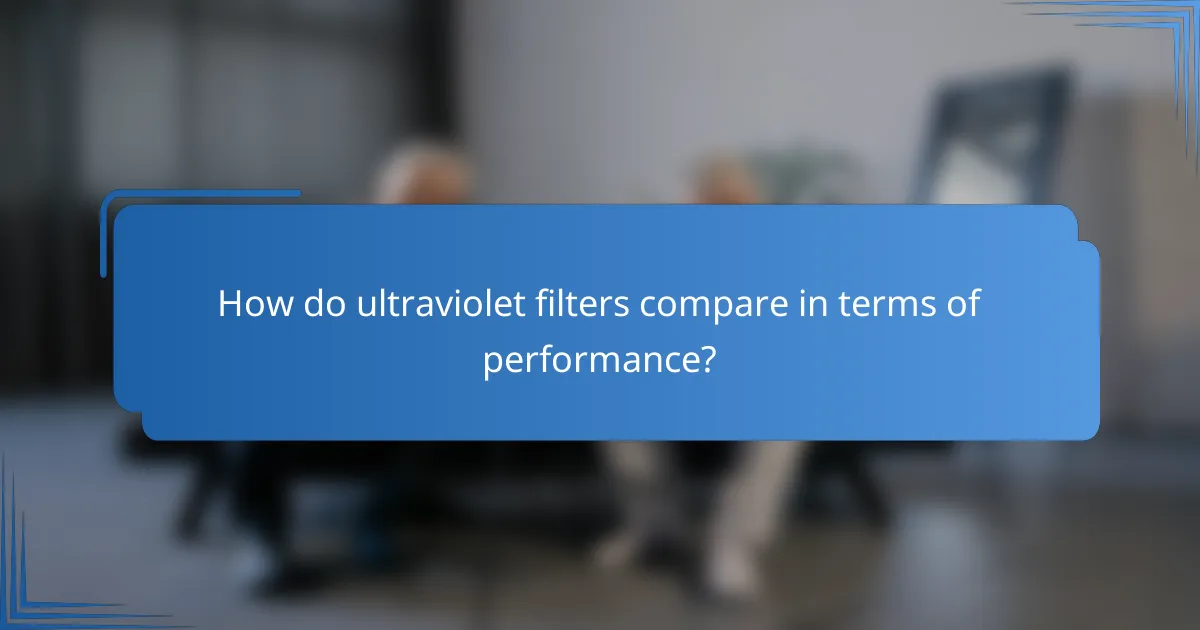
How do ultraviolet filters compare in terms of performance?
Ultraviolet filters are evaluated based on their effectiveness in blocking harmful UV rays, energy efficiency, and maintenance costs. Performance can vary significantly between brands, impacting both health benefits and long-term expenses.
Performance metrics of Brand A
Brand A is known for its high UV blocking efficiency, typically exceeding 90% for UVB rays and around 80% for UVA rays. This level of performance is crucial for environments where UV exposure is a concern, such as in aquariums or laboratories.
Energy consumption for Brand A filters is moderate, generally falling within the range of 30-50 watts. Replacement bulbs are required approximately every 12 months, with costs around $30 to $50 per bulb, depending on the retailer.
Performance metrics of Brand B
Brand B offers slightly lower UV blocking capabilities, with efficiencies around 85% for UVB and 75% for UVA. While still effective, this may be a consideration for users with specific UV exposure needs.
This brand is more energy-efficient, using about 20-40 watts, which can lead to lower electricity bills over time. Bulb replacement occurs every 10-14 months, with prices ranging from $25 to $45, making it a cost-effective option in the long run.
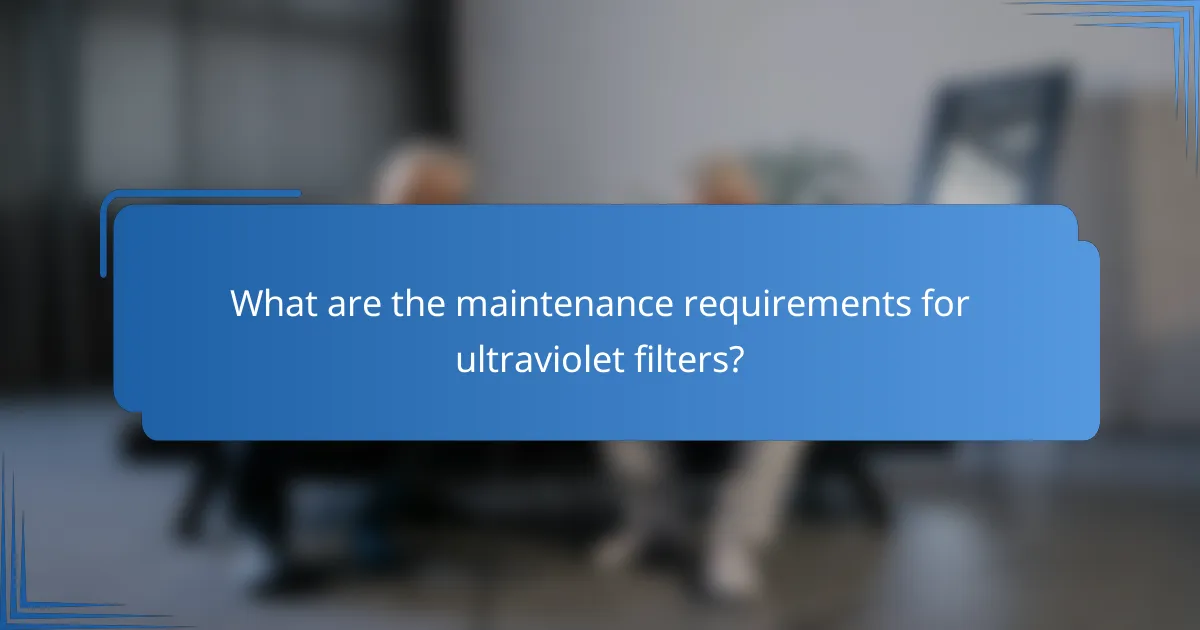
What are the maintenance requirements for ultraviolet filters?
Maintaining ultraviolet (UV) filters involves regular cleaning and timely replacement to ensure optimal performance. Proper upkeep can enhance the filter’s efficiency and prolong its lifespan, ultimately saving on energy costs and bulb replacement expenses.
Cleaning frequency
UV filters should be cleaned every few months, depending on usage and environmental factors. In areas with high dust or debris, more frequent cleaning may be necessary, potentially every four to six weeks. Regular cleaning helps maintain the filter’s effectiveness and prevents buildup that can hinder performance.
Use a soft cloth or a gentle cleaning solution specifically designed for UV filters to avoid damage. Always ensure the filter is powered off and cool before cleaning to prevent accidents.
Replacement schedule
Typically, UV bulbs should be replaced annually to maintain optimal performance, although some high-quality bulbs may last up to two years. Regularly check the manufacturer’s recommendations for specific replacement intervals, as this can vary by model.
Keep an eye on the bulb’s output; if you notice a decrease in effectiveness or a change in water clarity (if applicable), it may be time for a replacement. Budget for replacement costs, which can range from moderate to higher prices depending on the brand and specifications of the bulb.
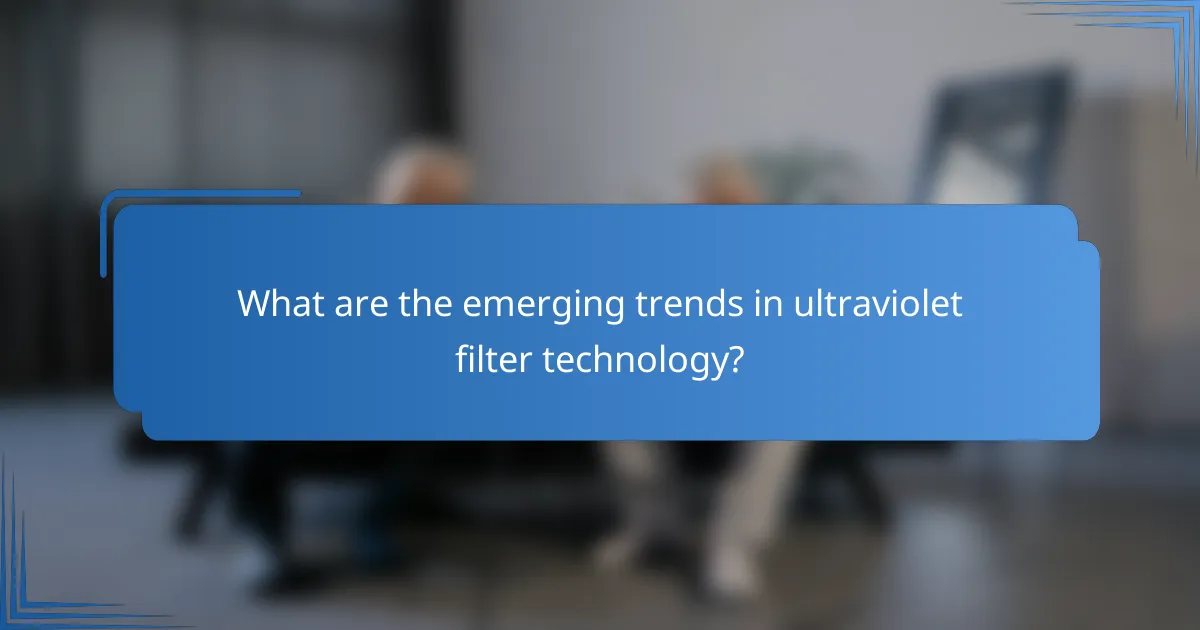
What are the emerging trends in ultraviolet filter technology?
Emerging trends in ultraviolet filter technology focus on enhancing energy efficiency and integrating smart systems. These advancements aim to reduce operational costs and improve user experience while maintaining effective UV filtration.
Advancements in energy efficiency
Recent developments in ultraviolet filter technology emphasize energy efficiency, leading to lower energy costs for users. New materials and designs allow for better UV light absorption while consuming less power, which can result in savings of up to 30% compared to older models.
When selecting an ultraviolet filter, consider the energy rating and operational costs. Look for filters that meet or exceed energy efficiency standards, as they can significantly reduce long-term expenses associated with bulb replacements and electricity usage.
Smart ultraviolet filter systems
Smart ultraviolet filter systems are gaining popularity due to their ability to monitor and adjust performance in real-time. These systems often come equipped with sensors that detect air quality and UV intensity, automatically adjusting the filtration process to optimize efficiency.
Investing in a smart ultraviolet filter can lead to better maintenance and lower replacement costs. Many models offer alerts for bulb replacements and maintenance needs, helping users avoid unexpected expenses and ensuring consistent performance.
